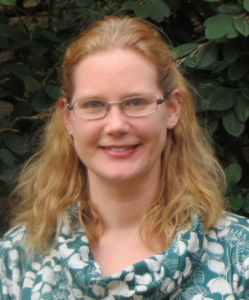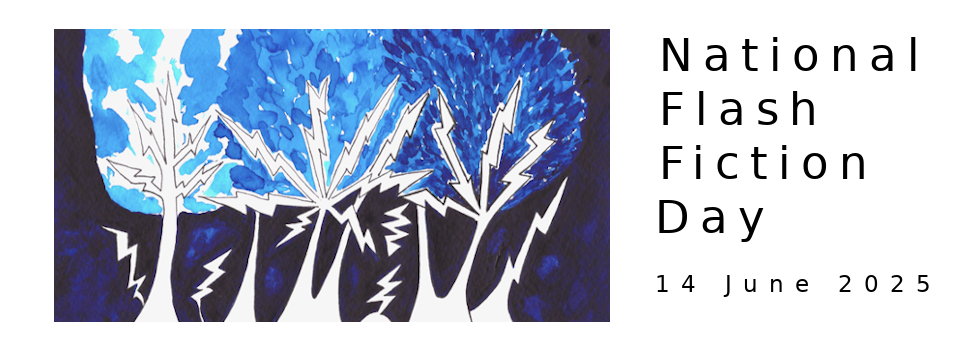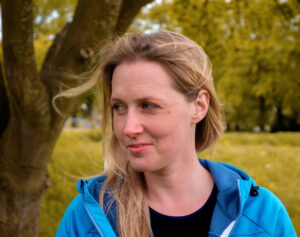Welcome to the sixth and last in a series of interviews with this year's National Flash Fiction Day anthology editors and microfiction competition judges! This week, Diane Simmons chats with one of this year's anthology editors, Ingrid Jendrzejewski, about childhood reading, language differences, and what she'd love to see in the submission queue for the 2020 NFFD anthology....
Diane: You are one of the editors for this year’s National Flash Fiction Day anthology. The theme is ‘family’. Is there anything in particular you are looking for or think people should perhaps avoid?
Ingrid: With any themed call-out, editors often receive clusters of stories with very similar characters, themes or conflicts. Pieces that delve into uncharted waters or that approach familiar topics from unusual angles enjoy a significant advantage. We want to hear the story only you can tell. Also, we’re open to all manner of interpretations of ‘family’; we want this word to be a springboard, not a restriction.
Diane: Your flash fictions have met with a great deal of success. Can you remember when you first encountered the form or felt inspired to write your own?
Ingrid: I loved Jorge Luis Borges from the moment I discovered Labyrinths on my parents’ bookshelves. Although I didn’t make a huge distinction between his poems and short stories and shorter short stories at the time, his were the first flash-length pieces I really fell for. I also really loved Raymond Carver.
I wrote short stories in my late teens and early twenties, some of which were rather short indeed, but it wasn’t until 2014 that I first intentionally set out to write something that was defined by a word count, highly compressed, and that had the texture of ‘flash’ as opposed to a very short short story. Although very short stories have been around, I'm sure, since words began, I feel so lucky to be writing in this particular moment; there is so much energy, experiment and play happening with flash fiction right now, and it’s wonderful to see the growing appetite for flash in readers and publishers.
Diane: Being a writer, a co-director of NFFD, editor-in-chief for Flashback Fiction and a flash editor at JMWW must keep you very busy. If you have any spare time, what else do you like to do?
Ingrid: So, I like kinda nerdy things. I love recreational programming, playing Go, and setting and solving puzzles. I don’t do any of these things as much as I’d like, although I do attempt ‘The Listener’ cryptic crossword every week. I need to do something analytical on a reasonably regular basis or I get a bit antsy.
Diane: Were you a reader as a child? If so, can you remember any books that you particularly loved?
Ingrid: Oh gracious, when I was little I lived at the local library, which was about three blocks from my house. From a very young age, I was allowed to go alone, and I remember spending hours there, first in the children’s section, then branching out to the reference section and other parts of the libary. (I remember that delicious, slightly naughty feeling that I was getting away with something by reading books from the GROWN-UP fiction shelves.)
This was all pre-internet, when the library felt like my only lifeline to the outside world. It was so exciting to find out about a new book, then order it on inter-library loan, wait weeks for it to arrive and then...devour it.
I don’t think of myself as having been a heavy genre fiction reader as a child, but when I jot down the books that made a big impression during those library years, I start with the Choose Your Own Adventure series, then move through the Tripod Trilogy by John Christopher, Michael Ende's The Neverending Story (with that magical red and green text), Ray Bradbury’s short stories, Frederik Pohl’s Heechee Trilogy, and Fahrenheit 451. Oh, and all of Borges. And A Tale of Two Cities. (Oh, Sydney Carton!) When I was a little older, I discovered the canonical greats of magical realism – Allende, Borges, Márquez, Morrison, Murakami, Rushdie, Vargas Llosa, etc.) – and then it felt like whole new universes opened before me.
Diane: You were born in the USA but live in the UK. When you write flash do you alter how or what you write depending on which country you are submitting the flash to?
Ingrid: That’s a great question. I usually localise the spelling, punctuation, and ‘obvious’ word difference, especially where it might cause confusion (‘sidewalk’/‘pavement’), (‘pants’/‘trousers’) or interfere with the emotional impact something is meant to have (ahem, ‘panties’/’knickers’). Sometimes, I have two separate versions where I use different references, or where I am extra careful to keep more subtle grammar differences in mind. I think it can be worth the effort, particularly when sending to smaller publications where editors might not receive many international submissions.
That being said, I’ve lived in the UK for pretty much my entire adult life, so my American English is both woefully dated and hybridised with British English. I don’t think I could pull off any sort of contemporary, slangy American voice without taking advice…though I usually get around the problem by writing things set in the past or avoiding dialogue altogether.
(For the record, at National Flash Fiction Day, we’re fine with submissions sent from anywhere in the world, using any flavour of English whatsoever. You don't need to change anything for us!)

Ingrid Jendrzejewski serves as a Co-Director of National Flash Fiction Day, Editor in Chief of FlashBack Fiction, and a flash fiction editor at JMWW. She has published over 100 shortform pieces and has won multiple flash fiction competitions, including the Bath Flash Fiction Award and AROHO’s Orlando Prize for Flash Fiction. Her short collection Things I Dream About When I'm Not Sleeping was a runner up for BFFA’s first Novella-in-Flash competition. She can be found online at www.ingridj.com and @LunchOnTuesday.
SUBMISSIONS ARE NOW OPEN for this year's National Flash Fiction Day Anthology and Micro Fiction Competition. Submissions close on 15th February 2020. For more information, please visit our Anthology and Competition pages.




 Rob Walton grew up in Scunthorpe, and now lives in Whitley Bay. His short fiction and poetry for adults and children appears in various magazines and anthologies. His flashes have appeared in Blue Fifth Review, 101 words (US), Flash Frontier (NZ), Love Bites (Dostoyevsky Wannabe), Port (Dunlin Press), Flash, I love You! (Paper Swans), Story Cities (Arachne Press), Ham, Ink, Sweat & Tears, The Cabinet of Heed, Number Eleven, National Flash Fiction Day anthologies, Bangor Literary Journal, Northern Voices, Popshot, Pygmy Giant, Reflex, Spelk, Words for the Wild and others. He has also written for performance and collated the text for the New Hartley Memorial Pathway. His words have appeared in shop windows and Scunthorpe United’s matchday magazine. He is a past winner of the UK’s National Flash Fiction Day micro-fiction competition.
Rob Walton grew up in Scunthorpe, and now lives in Whitley Bay. His short fiction and poetry for adults and children appears in various magazines and anthologies. His flashes have appeared in Blue Fifth Review, 101 words (US), Flash Frontier (NZ), Love Bites (Dostoyevsky Wannabe), Port (Dunlin Press), Flash, I love You! (Paper Swans), Story Cities (Arachne Press), Ham, Ink, Sweat & Tears, The Cabinet of Heed, Number Eleven, National Flash Fiction Day anthologies, Bangor Literary Journal, Northern Voices, Popshot, Pygmy Giant, Reflex, Spelk, Words for the Wild and others. He has also written for performance and collated the text for the New Hartley Memorial Pathway. His words have appeared in shop windows and Scunthorpe United’s matchday magazine. He is a past winner of the UK’s National Flash Fiction Day micro-fiction competition. FJ Morris is a proud Bristolian and award-winning author. Her collection ‘
FJ Morris is a proud Bristolian and award-winning author. Her collection ‘